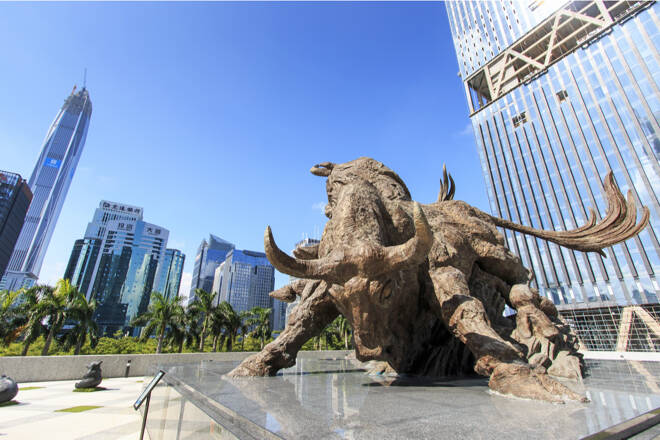Advertisement
Advertisement
Hang Seng Index, ASX 200, Nikkei 225: China in the Spotlight
By:
After the FOMC Projections response, the Hang Seng Index and the broader Asian markets will have private sector PMIs and China stats to consider.
Highlights
- On Thursday, the Hang Seng Index and ASX 200 ended the session in positive territory, while the Nikkei fell on a weaker USD/JPY.
- Dovish FOMC projections influenced the Asian markets.
- The Chinese economy and prelim private sector PMIs from Australia and Japan are focal points for the Friday session.
Overview of the Thursday Session
On Thursday, the Asian equity markets had another mixed session. The Hang Seng Index and ASX 200 ended the session in positive territory. Investors responded to the dovish FOMC projections, which signaled four rate cuts for 2024.
The US equity markets and 10-year Treasury yields reacted to the Fed, setting the tone for the Thursday session. On Wednesday, the Dow rallied 1.40%, with the S&P 500 and the Nasdaq Composite Index ending the day with gains of 1.37% and 1.38%, respectively. 10-year US Treasury yields slid by 4.35% to end the day at 4.35%.
On Thursday, 10-year Treasury yields continued to tumble, falling below 4% for the first time since August 10. However, a weaker USD/JPY impacted Nikkei-listed export stocks, leading the Index into negative territory.
On Thursday, better-than-expected core machinery orders from Japan failed to draw investor interest. Favorable employment numbers from Australia contributed to the session gains for the ASX 200.
US Retail Sales and Jobless Claims to Set the Tone
Overnight US economic indicators from Thursday will influence investor risk appetite early in the Asian session. US initial jobless claims declined from 221k to 202k in the week ending December 9. Significantly, retail sales increased by 0.3% in November, reversing a 0.2% decline from October. Economists forecast a 0.1% decline in retail sales.
The US equity markets and 10-year US Treasury yields responded to the numbers and will influence market risk sentiment going into the Friday Asian session. On Thursday, the Nasdaq Composite Index rose by 0.19%, with the Dow and the S&P 500 seeing gains of 0.43% and 0.26%, respectively. 10-year Treasury yields slid by 2.41% to end the day at 3.923%.
China and Private Sector PMIs in the Spotlight
The Asian economic calendar also warrants investor attention on Friday. Preliminary private sector PMIs for Australia and Japan need consideration. However, economic indicators from China could dictate market risk sentiment. Retail sales, industrial production, fixed asset investment, unemployment, and house price figures will move the dial.
Economists forecast a pickup in retail sales, industrial production, and fixed asset investment. However, a more marked decline in house prices would need consideration. Economists expect the unemployment rate to hold steady.
ASX 200
The ASX 200 surged 1.65% on Thursday. While the gains were broad-based, tech, mining, and gold (XAU/USD) led the way.
Northern Star Resources Ltd. (NST) and Evolution Mining Ltd. (EVN) ended the day up 8.12% and 3.93%, respectively.
BHP Group Ltd (BHP) and Rio Tinto Ltd. (RIO) gained 0.79% and 0.42%, respectively. Fortescue Metals Group Ltd. (FMG) jumped 2.81%.
The big four banks also ended the session in positive territory. Commonwealth Bank of Australia (CBA) and ANZ Group Holdings Ltd (ANZ) saw gains of 1.27% and 1.00%, respectively. National Australia Bank Ltd. (NAB) and Westpac Banking Corp. (WBC) rose by 0.64% and 0.68%.
Oil stocks joined the broader market in the green. Woodside Energy Group Ltd (WDS) and Santos Ltd (STO) ended the day up 0.47% and 2.88%, respectively.
Hang Seng Index
The Hang Seng Index ended the Thursday session up 1.07%. The Hang Seng Tech Index (HSTECH) saw a modest 0.34% gain, while the Hang Seng Mainland Properties Index (HSMPI) rose by 1.23%.
Alibaba (9988) and Tencent (0700) declined by 0.43% and 0.20%
Bank stocks had a mixed session. HSBC (0005) gained 0.74%. However, China Construction Bank (0939) and Industrial Commercial Bank (1398) ended the session flat.
The Nikkei 225
(Graph for reference purposes only)
The Nikkei declined by 0.73% on Thursday.
Bank stocks tumbled. Sumitomo Mitsui Financial Group Inc. (8316) and Mitsubishi UFJ Financial Group Inc. (8306) saw losses of 5.25% and 3.54%, respectively. However, it was another mixed session for the main components of the Nikkei.
Tokyo Electron Ltd. (8035) slid by 1.68%. Sony Group Corp. (6758) and KDDI Corp. (9433) ended the day down 1.07% and 1.10%, respectively.
However, Fast Retailing Co. Ltd. (9983) and Softbank Group Corp. (9948) rose by 0.62% and 0.87%, respectively.
For upcoming economic events, check out our economic calendar.
About the Author
Bob Masonauthor
With over 28 years of experience in the financial industry, Bob has worked with various global rating agencies and multinational banks. Currently he is covering currencies, commodities, alternative asset classes and global equities, focusing mostly on European and Asian markets.
Advertisement
